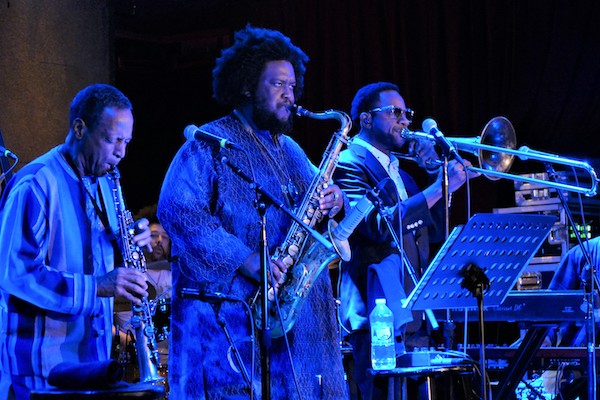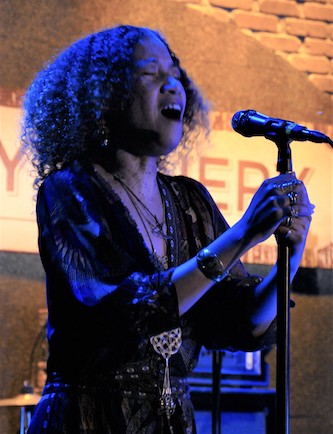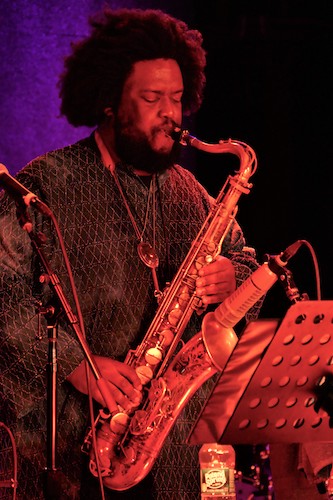Concert Review: Jazz Saxophonist Kamasi Washington and His Eight-Piece Ensemble — Their Virtuosic Sprawl Intact
By Paul Robicheau
The saxman and his usual band (including vocalist Patrice Quinn instead of the billed Ami Taf Ra) easily adapted to the 200-seat venue, barely modulating their visceral delivery while also highlighting their softer dynamics and a personal rapport.

Rickey and Kamasi Washington and Ryan Porter at City Winery. Photo: Paul Robicheau
Kamasi Washington mostly toured both large rock clubs — making him even more of a curious phenomenon as a jazz saxophonist — in addition to festivals over the years since his 2015 debut The Epic. Those bigger stages played to the levitating power of the hulking L.A. upstart’s tenor sax as well as the virtuosic sprawl of his eight-piece ensemble, including two drummers.
But Washington pulled into City Winery this week, Boston being the latest multi-show stop on a tour of those small clubs. And in Tuesday’s first of three nights, the saxman and his usual band (including vocalist Patrice Quinn instead of the billed Ami Taf Ra) easily adapted to the 200-seat venue, barely modulating their visceral delivery while also highlighting their softer dynamics and a personal rapport.
Washington matched the low-key setting in a modest blue dashiki suit, but he didn’t streamline his marathon approach with the band, stretching opener “The Garden Path” to 25 minutes. Though he built a hearty tenor solo, the leader gave more space to upright bassist Miles Mosley (who flashed nimble plucking and wah-wah bowing in his break) and keyboardist Brandon Coleman, who moved from Fender Rhodes to pitch-shifted synth, his Chick Corea-style solo negotiating the group’s turn from Coltrane-esque spiritualism to fusion driven by Robert Miller’s fusillade of drums. He commanded attention for his hyperactive polyrhythmic patter (later spread to cowbell and waves of cymbals), which evoked Billy Cobham and proved Miller’s a worthy successor in the band to Ronald Bruner Jr.

Patrice Quinn with Kamasi Washington at City Winery. Photo: Paul Robicheau
That throttling warmup aside, Washington addressed the near-full audience with an explanation of “Announcement,” a tune from his soundtrack to the Michelle Obama documentary Becoming, about the moment when her husband became president and the “faith and belief” that instilled. In his Inglewood environs, the saxophonist said, “it was as though the Lakers won” (presumably not a swipe that the rival Celtics were badly losing a playoff game down the street). Quinn’s voice and horns merged in unison swells, while Washington’s dad Rickey injected a fine solo on soprano sax and Ryan Porter lent smooth staccato runs on trombone.
The set peaked with a 20-minute “Space Travelers Lullaby,” which Washington said was inspired by his dream of a celestial being who acted like Dennis the Menace. The piece rose from a playful shuffle to Washington’s slow, sage-like tenor, which grew into elongated, impassioned lines until he handed the reins to Coleman, who took over with a fiery tour-de-force of digital piano clusters that eventually wound into teasing riffs from Elton John’s “Bennie and the Jets” that the horns picked up.
Alternate standout Quinn shined not only on orchestral vocals that likewise grace Washington’s records but on a cover of “Will You Still Love Me Tomorrow,” where she channeled her prayerful shimmy and gesticulations into a breathy, passionate reading of the song.
As usual, Washington was practically generous to a fault in giving more space to band mates, paying rapt attention with a smile from the wings during others’ solos, even if he’s heard them countless times. He also invited two young musicians (one his cousin) to the bandstand for “Can You Hear Him,” a nod to the music education mentorships he received, and both acquitted themselves well in solo turns.

Kamasi Washington at City Winery. Photo by Paul Robicheau
A 25-minute rendition of “Truth” pushed parameters even further as a piece that essentially combined five different songs along with members’ improvisational interpretations. “We’ll still be together,” Washington said of a sentiment that encompassed both music and life. “You don’t have to be the same to love each other.” Mosely unleashed a showstopping bass break that again wowed with the edgy precision of his pizzicato technique and electronics-enhanced bowing before Washington wove his sax through an Echoplex effect for a psalm-like ending.
But “Fists of Fury” gave drummer Tony Austin a solo chance to shine and lent the song a thematic climax as well. “Our time as victims is over,” singer Quinn declared, with horns in harmony. “We will no longer ask for justice. Instead, we will take our retribution.”
Kamasi and his crew certainly know how to take a stand — and make one at City Winery. It’ll be interesting to see if their Thursday finale, the only night expanded to two shows, can accommodate such weighty sets without cutting back.
Paul Robicheau served more than 20 years as contributing editor for music at the Improper Bostonian in addition to writing and photography for the Boston Globe, Rolling Stone, and many other publications. He was also the founding arts editor of Boston Metro.
Tagged: City Winery Boston, Kamasi Washington, Patrice Quinn
